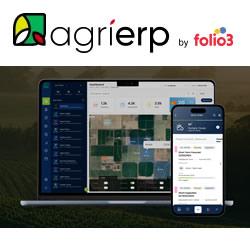Optimise one or manage many? REAP 2024 explores ag-tech's balancing act.
Industry leaders, farmers, innovators, and researchers will gather at Newmarket Racecourse on November 6th to learn about the latest ag-tech and explore insights from renowned industry leaders.
Technologies are now available for precise management within a field, herd, or flock. But where is the tipping point where the benefits from bespoke management of individual crops and livestock outweigh the broader, more general oversight of larger populations?
Agri-TechE's REAP Conference 2024 on 6th November at Newmarket Racecourse will seek to answer this question with contributions from internationally recognised speakers.
The potential applications of artificial intelligence to revolutionise agriculture by delivering bespoke management at scale will be the topic of the keynote address by Dr Elliott Grant, former CEO of Mineral. The firm was an Alphabet company applying breakthroughs in artificial intelligence to the challenges of making agriculture more sustainable before John Deere acquired Mineral's technology earlier this year.
Leaders from three global giants, John Deere, Bayer and Unilever, will discuss how supply chains can collaborate to deliver innovation to farmers. Phil Taylor, director of ecosystem development for Crop Science R&D, will represent Bayer on the panel.
"As an industry, we have spent the last five years recognising that we need to work together," says Phil. "The next ten years will be about how to make the whole system sustainable and self-supporting. To achieve this, we need to find new ways of partnering."
"Across the world, there are these global innovation hotspots. The Agri-TechE ecosystem is clearly one of them, where we see opportunities for Bayer to contribute and become part of the ecosystem."
The conference will close with three sessions that are regular fixtures at REAP.
The UK is known globally for its world-leading research. The Emerging Agri-Tech panel helps to put research into practice. Scientists share the inspiration for the progress of farmer-focussed projects they have underway, which are often the seeds for the most exciting future innovations in the industry.
Chaired by Cambridgeshire farmer Tom Pearson, the Emerging Agri-Tech session is an opportunity to grill researchers about their work and its relevance to farmers. The panel's purpose is to ensure agricultural research is driven by the needs of farmers and for farmers to understand better the sometimes opaque links between detailed research and its real-world applications.
The following session is renowned for featuring the Ones to Watch in the years ahead. The Start-up Showcase reveals Agri-TechE's top eight picks for the future of farming. The lineup for the REAP 2024 Start-up Showcase is revealed on the day.
Ensuring innovation is fit for farming in the real world is crucial. Because of this, REAP 2024 closes with a review of current farming practices thanks to a line-up of leading farmers who will ground-truth the concepts from the conference and share their views for the future.
To see and interact with the speakers first-hand, book a ticket for REAP 2024 on the Agri-TechE website.
[panel] The future of AI in agriculture: the keynote address at REAP 2024
We are in the early stages of AI in agriculture. What should growers be thinking about as they plan for the future?
"I think in 20 years we will look back and be incredulous that we used the same treatment across a whole field," comments Dr Elliott Grant, former CEO of Mineral and the keynote speaker at Agri-TechE's REAP Conference 2024 on Wednesday 6th November 2024.
Mineral set out to apply the transformative power of AI to help make agriculture more sustainable and to increase its resilience to climate change. The team developed tools to gather, organise, and analyse information about the plant world at a new level of precision and speed. Using millions of data points, they provided insights into the relationship between crop genetics, environmental impacts, and management practices on the farm.
Elliott argues that plant monitoring at high frequency, not just high resolution, will create additional knowledge that will unlock new paradigms in farming.
Mineral partnered closely with US-based Driscoll's, the world's leading berry company, to develop AI tools to improve crop phenotyping, better forecast yields, and optimise quality inspections.
Integrating hundreds of different data types like imagery, soils, weather, planting times, and historical yield is well-suited to the power of AI. A key learning from these initiatives was the synergy between human expertise and machine intelligence. It was found that the careful combination of human intuition and raw AI power, with each learning from the other, gave the best results.
From this experience, Mineral developed a three-layered perception framework for agriculture: what can a machine see? (perception); what can a machine deduce from this information? (reasoning and decision-making); and how can the machine act on it? (action).
Elliott gives one example of a possible future scenario. Instead of a shed full of task-specific equipment, next-gen farms may have software-defined robots updated with new capabilities remotely. This would enable multi-functional machines, replacing the need for investment in specialised equipment each time the farmer wants to diversify.
To listen to Dr Grant in person and have the opportunity to ask him questions, book a ticket for REAP 2024.
Featured Product

agrierp - Your One-Stop Farm Management Software
AgriERP is an all-in-one, comprehensive farm management suite, built by the farmers for the farmers to maximize profits. Built on the powerful ERP of Microsoft Dynamics 365, AgriERP enables farming enterprises to manage every aspect of their farm from financial management, inventory management, supply chain & logistics management, crop management, operations management, resource management, to sales, contracting, & shipping - All in a centralized platform.
